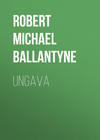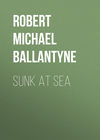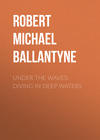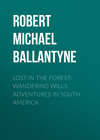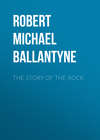Kitabı oku: «Ungava», sayfa 10
Chapter Sixteen.
Resources of the country begin to develop—Bryan distinguishes himself—Fishing extraordinary
There is a calm but deep-seated and powerful pleasure which fills the heart, and seems to permeate the entire being, when one awakens to the conviction that a day of arduous toil is about to begin—toil of an uncertain kind, perhaps connected with danger and adventure, in an unexplored region of the earth. Ignorance always paints coming events in glowing colours; and the mere fact that our adventurers knew not the nature of the country in which their tent was pitched—knew not whether the natives would receive them as friends or repel them as foes—knew not whether the nature and capabilities of the country were such as would be likely to convert the spot on which they lay into a comfortable home or a premature grave;—the mere fact of being utterly ignorant on these points was, in itself, sufficient to fill the poorest spirit of the band (had there been a poor spirit among them) with a glow of pleasurable excitement, and a firm resolve to tax their powers of doing and suffering to the uttermost.
When the sun rose on the following morning the whole party was astir, the fire lighted, and an early breakfast in course of preparation. Much had to be done, and it behoved them to set about it with energy and at once, for the short autumn of these arctic regions was drawing on apace, and a winter of great length and of the utmost severity lay before them.
There was also one consideration which caused some anxiety to Stanley and Frank, although it weighed little on the reckless spirits of the men, and this was the possibility of the non-arrival of the ship with their winter supply of provisions and goods for trade. Without such a supply a winter on the shores of Ungava Bay would involve all the hardships and extreme perils that too often fall to the lot of arctic discoverers; and he who has perused the fascinating journals of those gallant men, knows that these hardships and perils are neither few nor light. The leaders of the expedition were not, indeed, men to anticipate evils, or to feel unduly anxious about possible dangers; but they would have been more or less than human had they been able to look at Mrs Stanley and little Edith without a feeling of anxiety on their account. This thought, however, did not influence them in their actions; or, if it did, it only spurred them on to more prompt and vigorous exertions in the carrying out of their undertaking.
After breakfast Stanley assembled his men, and gave each special directions what to do. One of the most important points to ascertain was whether there were many fish in the river. On this hung much of the future comfort and well-being, perhaps even the existence, of the party. Gaspard was, therefore, ordered to get out his nets and set them opposite the encampment. Oolibuck, being officially an interpreter of the Esquimau language, and, when not employed in his calling, regarded as a sort of male maid-of-all-work, was ordered to assist Gaspard. The next matter of primary importance was to ascertain what animals inhabited the region, and whether they were numerous. Dick Prince, being the recognised hunter of the party, was directed to take his gun and a large supply of ammunition, and sally forth over the mountains in search of game; and as Massan was a special friend of his, a good shot, and, moreover, a sagacious fellow, he was ordered to accompany him. They were also directed to observe particularly the state of the woods and the quality of the timber growing therein; but as this last required special attention, the style and size of the future fort being dependent on it, François, the carpenter, was appointed to make a journey of observation up the Caniapuscaw River, in company with Augustus the Esquimau and Ma-istequan the Indian—it being thought probable that if natives were to be met with at all, they would be on the banks of the river rather than in the mountains. It was further arranged that Frank Morton should ascend the mountains in company with Bryan, and ascertain if there were any lakes, and whether or not they contained fish. As for Mr Stanley, he resolved to remain by the camp. On entering his tent after dispatching the several parties, he said to his wife—
“I’m going to stay by you to-day, Jessie. All the men, except Moses, Oostesimow, Gaspard, and La Roche, are sent off to hunt and fish in the mountains, and I have kept these four to paddle about this neighbourhood, in order to take soundings and examine the coast more carefully; because, you see, it would be an unfortunate thing if we began our establishment in a place not well suited for it.”
Mrs Stanley and Edith were, of course, quite pleased with this arrangement, and while the males of the party were absent, the former employed herself in dressing the skin of the deer that had been shot the day before. She accomplished this after the Indian fashion, by scraping and rubbing it with the animal’s brains. Afterwards she smoked it over a fire of green wood, and in this way produced a soft, pliant substance similar to chamois leather, but coarser and stouter. As for Edith, she rambled at will among the bushes of the nearest ravine, under the faithful guardianship of Chimo, and hurried back to the camp almost every hour, laden with cloudberries, cranberries, blaeberries, and crowberries, which grew in profusion everywhere.
Opposite to the camp the water was found to be eight fathoms deep. This was of great importance, as affording facility for unloading the ship abreast of the establishment. Higher up the river the ground was more favourable for building, both on account of its being more sheltered and better wooded with timber fit for the construction of houses; but the water was too shallow to float the ship, and the island before mentioned, which was named Cross Island, proved an effectual barrier to the upward progress of any craft larger than a boat. But as Stanley surveyed the spot on which the tent was pitched, and observed the sheltering background of mountains, with their succession of terraces; the creek or ravine to the right, with its growth of willows and stunted pines; the level parcel of greensward, with the little fountain under the rock; and the fine sandy bay in which Gaspard and Oolibuck were busily engaged in setting a couple of nets,—when he surveyed all this, he felt that, although not the best locality in the neighbourhood, it was, nevertheless, a very good one, and well suited in many respects for the future establishment.
“Please, sir, the net him set,” shouted Oolibuck from the shore to his master, who floated in the bay at the distance of a hundred yards, busily engaged with the sounding-line. On receiving this piece of information, Stanley ran the canoe on the beach, and said to his follower—
“Oolibuck, I have been thinking much about that river which we saw yesterday, off the mouth of this one; and I cannot help fearing that the ship will run into it, instead of into this, for the land is very deceptive.”
“Me t’ink dat is true,” answered the Esquimau, with a look of grave perplexity. “If de ship go into dat riv’r he t’ink we no arrive, and so he go ’way, and we all starve!”
“Nay, Oolibuck, I trust that such would not be the sad result of the ship failing to find us; but in order to prevent this, if possible, I intend to send you down to the coast, with a few days’ provisions, to keep a look-out for the ship, and light a fire if you see her, so that she may be guided to the right place. So get a blanket and your gun as fast as you can, and be off. I can only afford you four days’ provisions, Oolibuck, so you will have to prove yourself a good hunter, else you’ll starve. Will four days’ provisions do?”
Oolibuck’s eyes disappeared. We do not mean to say that they flew away, or were annihilated. But Oolibuck was fat—so fat that, when he laughed, his eyes reduced themselves into two little lines surrounded by wrinkles; a result which was caused by a physical incapacity to open the mouth and eyes at the same time. As a general rule, when Oolibuck’s mouth was open his eyes were shut, and when his eyes were open his mouth was shut. Being a good-humoured fellow, and of a risible nature, the alternations were frequent. It was the idea of Stanley doubting the sufficiency of four days’ provisions that closed the eyes of the Esquimau on the present occasion.
“Two days’ grub more dan ’nuff,” said Oolibuck. “Give me plenty powder and shot, and me no starve—no fear.”
“Very well,” rejoined Stanley, laughing, “take as much ammunition as you require, but be careful of it; if the ship fails us we shall need it all. And don’t be too eager after the deer, Oolibuck; keep a sharp look-out seaward, be on the hill-tops as much as you can, and keep your eyes open.”
Oolibuck replied by closing the said eyes with a smile, as he hurried towards the tent to prepare for his expedition. In the meantime Stanley directed Oostesimow and La Roche to set about building a small canoe out of the birch bark which they had carried with them for the purpose, the large canoes being too cumbrous for the purpose of overhauling the nets.
The nets had been set by Gaspard in the usual way—that is, with stones attached to the lower lines to act as sinkers, and floats attached to the upper lines to keep them spread; and it was with no little impatience that the party in the camp awaited the issue. Indeed they scarcely permitted an hour to pass without an inspection being ordered; but to their chagrin, instead of finding fish, they found the nets rolled up by the conflicting currents of the river and the tide into the form of two ropes.
“This will never do,” cried Stanley, as they brought the nets ashore. “We must set stake-nets immediately. It is nearly low tide now, so if we work hard they may be ready to set up before the tide has risen much.”
In pursuance of this plan, Stanley and his men went to the ravine, of which mention has been already made, and proceeded to cut stakes for the nets; while Oolibuck, having explained to Mrs Stanley and Edith that he was “going to look hout for de ship,” shouldered his wallet and gun, and ascending the ravine, speedily gained the first terrace of the mountains, along which he hastened in the direction of the sea-coast.
While the party in the camp were thus engaged, Frank Morton and Bryan instituted a thorough investigation of the country that lay directly in the rear of the camp, in the course of which investigation they made sundry interesting discoveries.
After ascending the ravine in which we left Stanley and his men cutting stakes for the nets, Frank and Bryan reached the first terrace, and proceeded along it in the opposite direction from that pursued by Oolibuck. A walk of a quarter of a mile, or less, brought them to another ravine, into which they turned, and the first thing that greeted them as they pushed their way through the stunted willows that thickly covered this gorge in the mountains was a covey of ptarmigan. These birds are similar in form and size to ordinary grouse, perhaps a little smaller. In winter they are pure white—so white that it is difficult to detect them amid the snow; but in summer their coats become brown, though there are a few of the pure white feathers left which never change their colour. Being unaccustomed to the sight of man, they stood gazing at Frank and Bryan in mute surprise, until the latter hastily threw forward his gun, when they wisely took to flight. But Frank arrested his follower’s arm.
“Don’t waste your powder and shot, Bryan, on such small game. There may be something more worthy of a shot among the mountains; and if you once raise the echoes among these wild cliffs, I fear the game will not wait to inquire the cause thereof.”
“Maybe not, sir,” replied Bryan, as he fell back a pace, and permitted Frank to lead the way; “but there’s an ould proverb that says, ‘A bird in the hand’s worth two in the buss,’ an’ I’ve great belaif in that same.”
“Very true, Bryan, there is much wisdom in old proverbs; but there are exceptions to every rule, and this is a case in point, as you will admit if you cast your eyes over yonder valley, and observe the edge of the mountain-top that cuts so clear a line against the sky.”
Frank pointed, as he spoke, to the shoulder or spur of one of the mountains which rose at a considerable distance in the interior, and from which they were separated by a dark glen or gorge; for none of the ravines in this part of the country merited the name of valley, save that through which flowed the Caniapuscaw River. The ravine up which they had been toiling for some time led into this darksome glen, and it was on rounding a bold precipice, which had hitherto concealed it from view, that Frank’s quick eye caught sight of the object to which he directed the attention of his companion.
“’Tis a crow,” said Bryan, after a gaze of five minutes, during which he had gone through a variety of strange contortions—screwing up his features, shading his eyes with his hand, standing on tip-toe, although there was nothing to look over, and stooping low, with a hand on each knee, though there was nothing to look under, in the vain hope to increase by these means his power of vision.
Frank regarded him with a quiet smile, as he said, “Look again, Bryan. Saw you ever a crow with antlers?”
“Anthlers!” exclaimed the Irishman, once more wrinkling up his expressive face, and peering under his palm; “anthlers, say you? Sorra a thing duv I see ’xcept a black spot on the sky. If ye see anthlers on it, ye’re nothin’ more nor less than a walkin’ spy-glass.”
“Nevertheless I see them, Bryan; and they grace the head of a noble buck. Now, you see, it is well you did not fire at the ptarmigan. Away with you, lad, down into that ravine, and clamber up the mountain through yonder gap with the fallen rock in the middle of it—d’ye see?—and wait there, lest the deer should turn back. In the meantime I’ll run round by the way we came, and descend to the water’s edge, to receive him when he arrives there. Now don’t lose yourself, and take care not to fire at smaller game.”
As Frank concluded these orders, which he issued in a quick low voice, he threw his gun into the hollow of his left arm and strode rapidly away, leaving his companion gazing after him with an expression of blank stupidity on his face. Gradually his cheeks and brow were overspread with a thousand wrinkles and a smile took possession of his lips.
“‘Don’t lose yersilf!’ Faix, Master Frank, ye’re free an’ aisy. Arrah now, Bryan dear, don’t lose yersilf; you that’s crossed the salt saes, an’ followed the Red Injins to the prairie, and hunted in the Rocky Mountains, and found yer way to Ungava—not to mintion havin’ comed oraginally from ould Ireland—which ov itsilf secures ye agin mistakes of every kind whatsumdiver. Lose yersilf! Musha, but ye had better git some wan to look after ye, Bryan boy. Take care now; go softly and kape yer eyes open, for fear ye lose yersilf!”
As Bryan mumbled forth this bantering soliloquy, he lifted up a large bag which contained a couple of fishing-lines and a few hooks, and throwing it across the stock of his gun, and both across his shoulder, he took his way down the rugged but well-beaten deer-path which led to the ravine or glen. The idea of losing himself seemed to have taken such a hold of Bryan’s mind, and afforded him so much amusement and such scope for the continued flow of bantering soliloquy to which he was in truth much addicted, that he failed to note the fact that he was walking along the edge of a steep declivity, at the foot of which lay a small, dark sheet of water, which was connected by a short river or strait with a larger lake, whose wavelets rippled at the base of the mountain beyond. The scene was magnificently wild and lonely, and would have riveted the attention and excited the admiration of any one less absent than Bryan. High, rugged, and to all appearance inaccessible mountains surrounded the vale on all sides; and although there were several outlets from it, these were so concealed by the peculiar formation of the wild mountains that they could not be seen until they were actually entered.
Had Bryan’s eyes been more active, he would have seen that the fringe of bushes by the side of the deer-track, along which he walked, concealed a declivity so steep that it almost merited the name of a precipice. But Bryan was lost in philosophic contemplation, and the first thing that awakened him to the fact was the slipping of a stone, which caused him to trip and fall headlong over the bank! The Irishman grasped convulsively at the bushes to arrest his fall, but the impetus with which he had commenced the descent tore them from his grasp, and after one or two unpleasant bounds and a good deal of crashing through shrubs that tore his garments sadly, he found himself stretched at full length on the margin of the river that connected the two lakes. So nearly had he been hurled into this strait by the violence of his descent that his head was hanging over the bank ere he stopped! Being partially stunned by the fall, Bryan lay for a few seconds motionless. As his shaken faculties returned, however, he became aware of the fact that a fish of fully two feet long lay at the bottom of the pool over which his head hung. Starting up, and totally forgetting his bruises, he turned to look for the bag containing the fishing-lines, and observing it lying on the ground not far distant, still wrapped round the gun, he ran to pick it up.
“Oh! wow! poor thing!” he exclaimed, on lifting up his gun, which, though fortunately not broken, was sadly bent, “ye’re fit for nothin’ but shootin’ round the corner now! It’s well for you, Bryan, ye spalpeen, that your backbone is not in the same fix.”
While he thus muttered to himself, Bryan drew from the bag a stout cod-line, to which he fastened a hook of deadly dimensions, and dressed it into the form of a fly, much in the same manner as was formerly done by La Roche. This line and fly he fastened to the end of a short stout pole which he cut from a neighbouring tree, and approaching cautiously to the bank of the strait—for there was too little motion in it to entitle it to be called a stream—he cast the fly with a violent splash into the water. The violence was unintentional—at least the exclamations of reproach that followed the cast would lead us to suppose so. The fish here were as tame as those caught in Deer River. In a few seconds the fly was swallowed, and Bryan, applying main force to the pole, tossed a beautiful trout of about two pounds weight over his head.
“Och! ye purty crature,” exclaimed the delighted Irishman, rubbing his hands with glee as he gazed at the fish after having unhooked it. “Shure ye’ll make a beautiful fagure in the kittle this night. An’ musha! there’s wan o’ yer relations to kape ye company,” he added, as, exerting an enormous degree of unnecessary force, he drew another trout violently from the water. The second trout was larger than the first, and Bryan soon became so excited in the sport that he totally forgot Frank’s orders, and the deer, and everything else in the world, for the time being. Having caught six or seven trout, varying from two to four pounds in weight, he changed his position a little, and made a cast over a deep pool nearer to the large lake. As heretofore, the fly was engulfed the instant it fell on the water; but Bryan did not, as heretofore, haul the fish violently out of its native element. It is true he attempted to do so, but the attempt proved utterly futile; moreover, the fish darted with such velocity and strength towards the lake, that the angler, albeit entirely ignorant of his art, experienced an inward conviction that the thick cord would snap altogether if not eased of the enormous strain. He therefore followed the fish at the top of his speed, uttering incomprehensible sounds of mingled rage and amazement as he went, and tripping over rocks and bushes in his headlong career. After a smart run of half a minute the fish stopped, turned, and darted back so rapidly that Bryan tripped in turning and fell into the water! The place was shallow, but having fallen on his back, he was thoroughly drenched from head to foot. He did not lose the grasp of his rod, however. Spluttering, and gasping, and dripping, he followed the fish in its wild career until it turned again at a tangent, and darted towards the bank on which he stood. There was a shelving bed of pebbles, where the water shoaled very gradually. Bryan saw this. Availing himself of the fish’s impetus, and putting all his force to the rod, he dragged it into two inches of water, when the line broke. Instantly the fish struggled towards deep water; but it was so large, and the place to which it had been dragged so shallow, that it afforded the excited angler time to rush forward and throw himself bodily on the top of it!
The battle that now ensued was of an energetic and deadly character on the part of both man and fish. Those who have not grasped a live salmon in their arms have no conception of the strength of a fish; and perhaps it may be said with equal truth that those who have never wielded a forehammer have but a faint conception of the strength of a blacksmith’s knuckles. Bryan had thrown his whole weight on the fish, and grasped it, as with a vice, in both hands; but at every struggle of its powerful frame he felt how uncertain was the hold he had of its slippery body. Once it almost escaped, and dashed the spray over its adversary’s face with its tail, as it wriggled out of his grasp; but with a desperate plunge Bryan seized it by the head and succeeded in thrusting his thumb under its gill and choking it, while himself was well-nigh choked at the same moment by unintentionally swallowing a gulp of the muddy compound which they had stirred up in their struggles. Slowly and with caution Bryan rose on one knee, while he crushed the fish against the bottom with both hands; then making a last exertion, he hurled it up the bank, where it fell beyond all hope of return to its native element.
The fish thus captured was a beautiful trout of about twenty pounds weight. The lake trout of North America are, some of them, of enormous size, being not unfrequently taken of sixty pounds weight, so that as a specimen of those inhabiting these lakes this was by no means a large one. Nevertheless it was a splendid fish, and certainly the largest that had ever been captured by the worthy son of Vulcan.
The thick coat of liquid mud with which his face was covered could not entirely conceal the smile of intense satisfaction with which he regarded his prize, as he sat down on the bank before it.
“Kape quiet now, honey!” he exclaimed, as the trout made a last fluttering attempt to escape; “kape quiet. Have patience, darlint. It’s o’ no manner o’ use to hurry natur’. Just lie still, an’ it’ll be soon over.”
With this consolatory remark, Bryan patted the fish on the head, and proceeded to wring the water from his upper garments, after which he repaired his broken tackle, and resumed his sport with an eagerness and zest that cold and water and mud could not diminish in the smallest degree.
